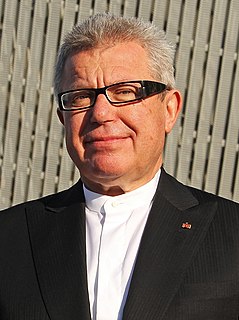Top 86 Planners Quotes & Sayings - Page 2
Explore popular Planners quotes.
Last updated on November 17, 2024.
With regard to power, women don't have the vanity men have. They don't need to make power visible, they only want the power to give them the other things they want. Security. Food. Enjoyment. Revenge. Peace. They are rational, power-seeking planners, who think beyond the battle, beyond the victory celebrations. And because they have an inborn capacity to see weakness in their victims, they know instinctively when and how to strike. And when to stop. You can't learn that.
Most people are oblivious to F.A. Hayek's insight that the critical information needed to run an economy - or even 15 percent of one - doesn't exist in any one place where it is accessible to central planners. Instead, it is scattered piecemeal among millions of people. All those people put together are far wiser and better informed than Congress could ever be. Only markets - private property, free exchange and the price system - can put this knowledge at the disposal of entrepreneurs and consumers, ensuring the system will serve the people and not just the political class.
It is argued by our GDP obsessed policy planners that eventually the money being made by the stock market operators or the IT industry would trickle down to the poor farmers in terms of ancillary jobs that would be created. But the fact is, that this has not happened, despite the boom in the stock market and the IT industry.
Cities must urge urban planners and architects to reinforce pedestrianism as an integrated city policy to develop lively, safe, sustainable and healthy cities. It is equally urgent to strengthen the social function of city space as a meeting place that contributes toward the aims of social sustainability and an open and democratic society.
This mutual dependencies no longer the dialectical relationship between master and servant, which has been broken in the struggle for mutual recognition, but rather a vicious circle which encloses both the master and the servant. Do the technicians rule, or is their rule that of the others, who rely on the technicians as their planners and executors?
We started with things like locating ski runs or locating a transmission line corridor or locating a new town or doing a coastal zone plan. We ourselves weren't doing the planning work, but we were doing all the mapping work for the landscape architects and planners who would subsequently incorporate the maps into their actual designs.
During bomb drills, we students were told to crouch under our desks. Apparently the desks used in classrooms in the fifties were made of an exceptionally missile-resistant variety of wood. During the Cold War years I often wondered why it never occurred to our defense planners to protect the entire nation from nuclear attack by simply covering it, from sea to shining sea, with a huge Strategic Classroom Desk.
The leviathan state, that monster devouring civilization in this century, is in the throes of death. This is not a wish or a prediction, but a conclusion drawn from a broad look at the trends of the last decade and a half, which, if we take the right steps, can continue on into the next century. What has happened around the world - nations states collapsing, markets outwitting planners, citizens rising up against government masters - can and is happening here at home.
Of all the islands he'd visited, two stood out. The island of the past, he said, where the only time was past time and the inhabitants were bored and more or less happy, but where the weight of illusion was so great that the island sank a little deeper into the river every day. And the island of the future, where the only time was the future, and the inhabitants were planners and strivers, such strivers, said Ulises, that they were likely to end up devouring one another.
In the planning and designing of new communities, housing projects, and urban renewal, the planners both private and public, need to give explicit consideration to the kind of world that is being created for the children who will be growing up in these settings. Particular attention should be given to the opportunities which the environment presents or precludes for involvement of children both older and younger than themselves.
But too often the goal of the planners is a universal gray state of health corresponding to absence of disease rather than to a positive attribute conducive to joyful and creative living. This kind of health will not rule out and may even generate another form of ill, the boredom which is the penalty of a formula of life where nothing is left unforeseen.
It is rarely remembered now that socialism in its beginnings was frankly authoritarian. It began quite openly as a reaction against the liberalism of the French Revolution. The French writers who laid its foundation had no doubt that their ideas could be put into practice only by a strong dictatorial government. The first of modern planners, Saint-Simon, predicted that those who did not obey his proposed planning boards would be 'treated as cattle'.
In the usual (though certainly not in every) public decision on economic policy, the choice is between courses that are almost equally good or equally bad. It is the narrowest decisions that are most ardently debated. If the world is lucky enough to enjoy peace, it may even one day make the discovery, to the horror of doctrinaire free-enterprisers and doctrinaire planners alike, that what is called capitalism and what is called socialism are both capable of working quite well.
Planners and designers should encourage as much diversity in human habitats as they find in animal habitats. It is not possible to resolve all conflicts or to gain all ends. Choices have to be made. Different aspects of the public good should be stressed in different places. To achieve variety in land use patterns, there should also be a variety of relationships between the professions, not an institutionalized decision-making tree. Relationships between the constructive professions should, therefore, be deconstructed.
We shifted our philosophy from being a computer mapping group that would support planners to the idea of building actual software that would be well engineered. Because at that time, our software was not well-engineered at all; it was basically built with project funding and for project work, largely by ourselves.
So here's my advice to city planners. Make your city runnable. Runners are the first wave of troops bringing human activity back to the urban core of any city. Where we go, others will follow. The connection between runnability and livability is so clear (at least to me), that it's surprising that new developments consistently leave pathways out of the plans.
The Internet has taken shape with startlingly little planning? The most universal and indispensable network on the planet somehow burgeoned without so muchasa boardofdirectors, never minda mergers-and- acquisitions department. There is a paradoxical lesson here for strategists. In economic terms, the great corporations are acting like socialist planners, while old- fashioned free-market capitalism blossoms at their feet.
People vastly overestimate the ability of central planners to improve on the independent action of diverse individuals. What I've learned watching regulators is that they almost always make things worse. If regulators did nothing, the self-correcting mechanisms of the market would mitigate most problems with more finesse. And less cost.
That the sight of people attracts still other people, is something that city planners and city architectural designers seem to find incomprehensible. They operate on the premise that city people seek the sight of emptiness, obvious order and quiet. Nothing could be less true. The presences of great numbers of people gathered together in cities should not only be frankly accepted as a physical fact... they should also be enjoyed as an asset and their presence celebrated.
It is up to us, to this present generation of Americans, to take a stand for freedom, to send a message to Washington that we're taking our future back from the grips of central planners who would control our healthcare, who would spend our treasure, who downgrade our future and micro-manage our lives.
For many people, the only reason to do anything is that it's best for them individually. And I think that's why planners have to be more realistic about devising policies so the stakeholders will say, "I see what you mean - that'll help me." I think expecting people to do the right thing for the right reason leads to a lot of failure in public policy.
I believe that the idea of the totality, the finality of the master-plan, is misguided. One should advocate a gradual transformation of public space, a metamorphic process, without relying on a hypothetical time in the future when everything will be perfect. The mistake of planners and architects is to believe that fifty years from now Alexanderplatz will be perfected. -p.197
Quinn's First Law of Investing is never to buy anything whose price you can't follow in the newspapers. An investment without a public marketplace attracts the fabulists the way picnics attract ants. Stock brokers and financial planners can tell you anything they want, because no one really knows what's true. The First Corollary to Quinn's First Law states that, even when the price is in the newspapers, you shouldn't buy anything too complex to explain to the average 12-year-old.























